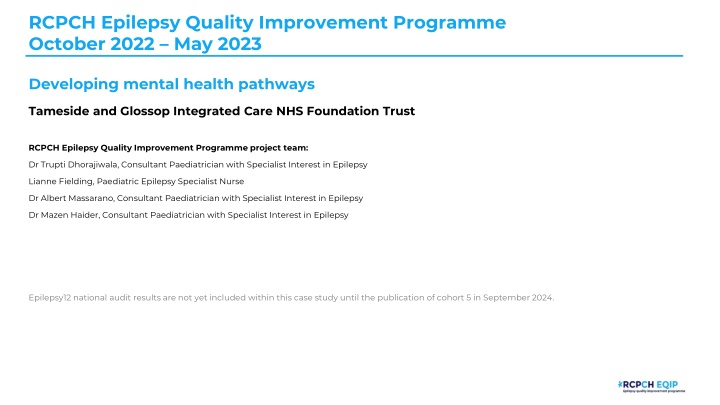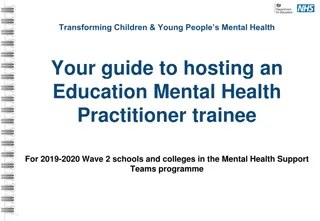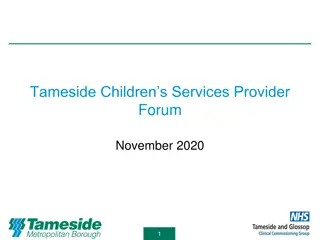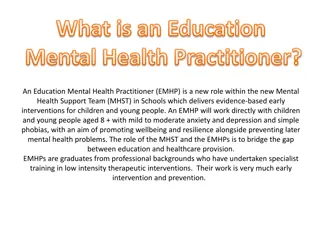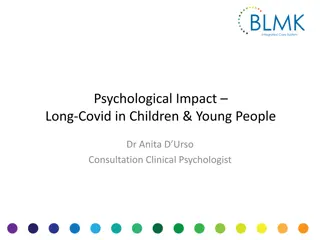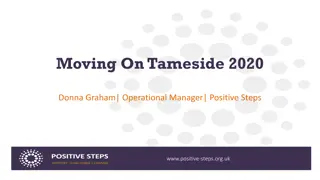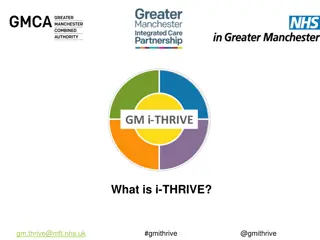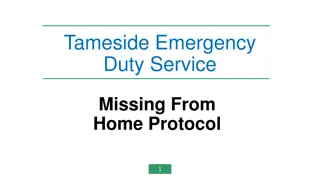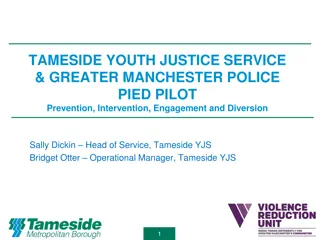Developing Mental Health Pathways for Children and Young People in Tameside and Glossop
Many children and young people in Tameside and Glossop struggle with mental health issues, impacting their school attendance and quality of life. The project aims to develop a mental health guide focusing on managing emotions, involving patients and families in co-designing resources and screening tools to provide timely support within local NHS services and the voluntary sector.
Download Presentation

Please find below an Image/Link to download the presentation.
The content on the website is provided AS IS for your information and personal use only. It may not be sold, licensed, or shared on other websites without obtaining consent from the author.If you encounter any issues during the download, it is possible that the publisher has removed the file from their server.
You are allowed to download the files provided on this website for personal or commercial use, subject to the condition that they are used lawfully. All files are the property of their respective owners.
The content on the website is provided AS IS for your information and personal use only. It may not be sold, licensed, or shared on other websites without obtaining consent from the author.
E N D
Presentation Transcript
RCPCH Epilepsy Quality Improvement Programme October 2022 May 2023 Developing mental health pathways Tameside and Glossop Integrated Care NHS Foundation Trust RCPCH Epilepsy Quality Improvement Programme project team: Dr Trupti Dhorajiwala, Consultant Paediatrician with Specialist Interest in Epilepsy Lianne Fielding, Paediatric Epilepsy Specialist Nurse Dr Albert Massarano, Consultant Paediatrician with Specialist Interest in Epilepsy Dr Mazen Haider, Consultant Paediatrician with Specialist Interest in Epilepsy Epilepsy12 national audit results are not yet included within this case study until the publication of cohort 5 in September 2024.
Developing mental health pathways Tameside and Glossop Integrated Care NHS Foundation Trust Project aim To develop and implement by Summer 2023 a mental health guide for all children and young people 11 to 17, focused on understanding and managing emotions. Background Many of the children and young people seen by the Tameside and Glossop Integrated Care NHS Foundation Trust s paediatric epilepsy service team are struggling with mental health and wellbeing, and are not receiving the appropriate help they require in a timely manner. Often, this goes unnoticed until their school attendance and quality of life are significantly affected. CAMHS referrals are a minimum of a 12 month wait at present, which means children and young people's school attendance and quality of life continue to be affected while awaiting the initial CAMHS assessment. Many patients seen in clinic have underlying mental health or psychological health needs; therefore, the aim is to explore screening pathways to provide appropriate support with the available resources they have within the local NHS services and the voluntary sector. Area of focus The team plans to run focus groups with a small cohort of patients to gain a better understanding of their mental health and wellbeing needs. Patients and families will be included in the co-design of developing resources and signposting pathways to support their needs. The goal is to produce a booklet together with children and young people and test the preferred method of screening tools out of the two that will be used during the sessions.
Developing mental health pathways Tameside and Glossop Integrated Care NHS Foundation Trust
Developing mental health pathways Tameside and Glossop Integrated Care NHS Foundation Trust
Developing mental health pathways Tameside and Glossop Integrated Care NHS Foundation Trust Changes Before the team began their EQIP project, they were already in the process of collating resources to create mental health resource packs, including signposting their patients to local support services. The team initially focused on understanding the available screening tools to help ascertain the level of support patients require because there was an inefficient process in place. Two screening tools were sourced: one was a wellbeing index tool, which is recommended by the WHO, called the Outcome Rating Scales (ORS) and Session Rating Scales (SRS), and one used by the Child and Adolescent Mental Health Services (CAMHS). The team established and developed relationships with a clinical psychologist from CAMHS who had offered to volunteer their time to offer one-on-one supervision sessions and provide some specific advice for the patients the team is particularly concerned about, and a clinical psychologist who works with a local voluntary organisation called PHEW that supports families with children with physical health difficulties that are causing distress as well as helping children who experience emotional difficulties. The paediatric epilepsy specialist nurse was temporarily supported by the CAMHS clinical psychologist, who agreed to provide input with a small group of young people aged between 11 and 17 years old and their parents/carers for 6 weeks, attending 6 sessions once a week to support them in managing and understanding their emotions. Established changes in processes to capture patient and parent/carer voices at clinic appointments and home visits feed into service improvement. The children and young people attending the group sessions were increasing in confidence to engage as the sessions continued. Collated third-sector information and signposting as part of the referral pathway. The team also engaged with the local HOPE parent/carer and child support groups for children and families for additional support needs.
Developing mental health pathways Tameside and Glossop Integrated Care NHS Foundation Trust Results The children and young people focus group was shown the two mental health screening tools to interact with to provide their views on their preferred choice. The tool used by CAMHS uses a scoring system where low scores (below 13) indicate poor wellbeing and are an indication for testing for depression under clinical classification ICD-10, which means those patients should be referred to CAMHS. Results from the focus group using the screening tools revealed none of the children in the group scored lower than 13, which highlighted that this could be managed with the wellbeing booklet as an early intervention whilst waiting to be seen by CAMHS or within third-sector services. Results from the screening tools were not as the team expected because they did not meet criteria for a CAMHS referral or assessment, which reinforced the need for a wellbeing resource for understanding and managing emotions. The team has interpreted from this experience that some early intervention, understanding, and managing emotions might in fact be helpful to address concerns and worries. Results from other engagement methods, such as Post-it notes, marbles and counters in jars, and the interactive online voting platform Mentimeter, learned via Emma Sparrow, Head of CYP Engagement at the RCPCH&US, covered themes such as general worries on topics such as the war in Ukraine, school bullies, and school itself, which the team found were the same themes coming from the focus group. Some children and young people wanted to know if other children with the epilepsy condition had the same experience. Other collated feedback from patients was: Worries about having blood tests, investigations, and scans o Trigger emotions around having seizures or uncertainty around when the next seizure would be o Comments mainly revolve around general worries, feeling safe, and people knowing what to do o Parental overprotection o Meeting other people with epilepsy o Therefore, the team planned to have these concerns addressed within the content of the wellbeing booklet. The booklet could be positive in relation to an action plan and recognising emotions, behaviours, and strategies to help.
Developing mental health pathways Tameside and Glossop Integrated Care NHS Foundation Trust Results The team discovered that many of the anxieties experienced by the children and young people were shared parental anxieties, which resulted in the parents recognising that maybe they had been limiting their children s independence. Observation and hearing from their children and young people helped them understand and manage their own emotions. It was discovered that patient and parental anxiety was heightened during the waiting time for investigations. The wait time for patients to have an MRI scan is currently 12 18 months with sedation vs 4 weeks without sedation. To support their patients and families during this period, the team plans to collaborate with the assistant clinical psychologist to develop three social stories (blood tests, MRIs, and EEGs) with the intention of providing children and young people with information and adequate preparation with the aim of reducing anxieties.
Developing mental health pathways Tameside and Glossop Integrated Care NHS Foundation Trust
Developing mental health pathways Tameside and Glossop Integrated Care NHS Foundation Trust Who was involved? Feedback received Children & parent/ carers Myself & Consultant clinical psychologist CAMHS Feedback results have covered themes such as general worries. Same theme coming from the focus group where we reviewed the screening tools. Can be addressed in terms of the content in the well- being booklet.
Developing mental health pathways Tameside and Glossop Integrated Care NHS Foundation Trust
Developing mental health pathways Tameside and Glossop Integrated Care NHS Foundation Trust
Developing mental health pathways Tameside and Glossop Integrated Care NHS Foundation Trust Challenges There is no current pathway to mental health services, and there is limited to no access for patients to be referred to CAMHs. Using their ESN s voluntary time to be coached by local mental health services is not a sustainable process. The team experienced issues around attendance from patients and families, who were unable to attend because the focus group was hosted at the height of the winter period, and parent/patient illness/admissions resulted in the x2 session having to be cancelled. The children and young people involved in the focus group did not feel confident at first to share their experiences and discuss their needs. The team was able to mitigate against this by using the interactive online voting platform Mentimeter, which provided anonymous answers to questions and proved more suitable for children and young people. The CAMHS clinical psychologist supporting the team handed in their notice during the development of their project. This practitioner had been instrumental in providing supervision, leading the focus group sessions, and using the scoring tool for mental health screening. The team mitigation plans against losing supervision support were to highlight what had been achieved so far with senior management and to continue this work with the new person in post. The team is motivated but has limited time. Team meetings are often arranged but cancelled due to A/L, workload, and consultant hot weeks/on call. Planned to invite 10 children and young people and their parents/carers. This was reduced because the maximum number that could be invited was five children with a parent/carer due to the size and space of the clinic room. At times, the team found it difficult to coordinate the hosting of the focus group in relation to room availability and size within the Trust. The project has been undertaken at a time of significant staff change within the team. Impact of nursing and doctor strikes, and strep throat surge affecting staff and service.
Developing mental health pathways Tameside and Glossop Integrated Care NHS Foundation Trust Outcomes The team is in the process of creating the wellbeing pack from the research provided by multiple resources and advice from the consultant and clinical psychologist. The content will include techniques such as breathing exercises and progressive muscle relaxation. Once the booklet is approved by the internal governance team, it will be shared with EQIP. The team had further engagement with one or two young people to help with providing input into the design and content of the wellbeing pack. The team plans to create a social story in collaboration with the clinical psychologist to help prepare children and young people when attending hospital for tests and investigations, using visual aids to present the story along the way. The team discovered that the majority of their caseload can benefit from adequate signposting and early intervention rather than a CAMHS referral. Processes and systems have changed in how they interact and engage with children and young people in terms of using different methods such as QR codes and Mentimeter. Team meetings have increased in terms of priorities. The team learned the importance of capturing both children and young people's voices and feedback. There are clearer plans and processes in place to support children and young people. The team plans to use what they have learned to implement improvements in other areas, such as their transition service. Changing their practice and potentially other teams practices by sharing their experience and best practices.
Developing mental health pathways Tameside and Glossop Integrated Care NHS Foundation Trust Lessons learnt The team acknowledged lessons learned from the assumptions made regarding children and young people preferring to attend sessions virtually; however, the response received unanimously was the opposite, where their preference was having face-to-face focus group sessions, which came as a surprise to the team. Other assumptions made were that patients were only worried about their epilepsy condition, when in fact, many had general worries on topics such as the war in Ukraine, school bullies, and school itself, which the team acknowledged as lessons learned. The goal of improvement is not the screening tool; the goal is understanding the required help for children once they have been screened. It's important that once screening is completed; services understand what their patients' needs and wants are and then guide them to the resources that are available. The team witnessed that many of the anxieties experienced by the children and young people were a result of their parental anxieties. Understanding the importance of knowing when and how to host engagement activities by asking patients and families first. The team readjusted their focus to the clinical experience with these patients rather than just the use of the evidence-based tool. Throughout the training on the EQIP, the team has learned that improvement is not just about anecdotal evidence; this is their patient's reality, and their team's role is to try to find out what they can do to support them going forward. What kind of information do they need? What do patients need this week, next week, or next month? What can they do to help them? The temporary supervision support provided by clinical psychology provided many lessons for the team when identifying patients' needs requiring wellbeing support compared to those with more complex needs. Appointing a transition nurse within the team is a positive step in addressing the worries highlighted around transition.
https://eqip.rcpch.ac.uk eqip@rcpch.ac.uk @RCPCHEQIP
